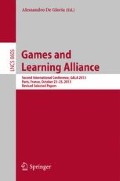Abstract
Safety and energy-efficiency is the main aim of every reasonable driver. But often there is too much relevant information a driver has to take into account and evaluate. A useful support can be provided by technology that can observe the driver’s situation, analyze it, and offer individualized information and services to the driver. Moreover, by means of gamification mechanisms drivers can receive valuable feedback and motivation to improve their behavior. This paper presents such a situation-aware gamification approach in logistics, which has been elaborated in the LogiAssist project and enhanced in the TEGA game. A first user study indicated the general usefulness of this approach and revealed also several shortcomings. These results imply that this synergy of various technologies provides a promising opportunity for further investigation and development.
Access this chapter
Tax calculation will be finalised at checkout
Purchases are for personal use only
Notes
- 1.
The course “Hightech Entrepreneurship and New Media” combines tutorials and lectures on the development of complex information products with practical experience in start-ups (in this case Humance AG) solving concrete IT related tasks. An important part of the course is the development of soft skills, including presentation, planning and cooperation in a team, as well as communication with the customer. Integrated into the concept of this course is the procurement of useful information for start ups in high-tech branches, taught by practitioners. The outcomes of the project are presented in a public presentation at the end of the course.
References
Horn, B.E., Tardif, L.P.: Licensing and training of truck drivers-new and continuing challenges. IATSS Res. 23, 16–25 (1999)
Fisher, D.L., Laurie, N.E., Glaser, R., Connerney, K., Pollatsek, A., Duffy, S.A., Brock, J.: Use of a fixed-base driving simulator to evaluate the effects of experience and PC-based risk awareness training on drivers’ decisions. Hum. Factors J. Hum. Factors Ergon. Soc. 44(2), 287–302 (2002)
Nagatsuka, Y.: Are licensed drivers “perfect drivers”? Getting a driver’s license and driver training: current situation in Japan. IATSS Res. 23(HS-042 888), 93–99 (1999)
Rothe, J.P. (ed.): Driving Lessons: Exploring Systems that Make Traffic Safer. University of Alberta, Edmonton (2002)
Scheffel, M., Kirschenmann, U., Taske, A., Adloff, K., Kiesel, M., Klemke, R., Wolpers, M.: Exploring LogiAssist - the mobile learning and assistance platform for truck drivers. In: Accepted for 8th European Conference on Technology Enhanced Learning (EC-TEL 2013), 17–21 September 2013, Paphos, Cyprus (2012)
Wolf, G., Carmichael, A., Kelly, K.: The quantified self. TED (2010). http://www.ted.com/talks/gary_wolf_the_quantified_self.html
Swan, M.: Sensor mania! The Internet of Things, wearable computing, objective metrics, and the Quantified Self 2.0. J. Sens. Actuator Netw. 1(3), 217–253 (2012)
Darby, S.: The effectiveness of feedback on energy consumption. A Review for DEFRA of the Literature on Metering, Billing and direct Displays, pp. 1–21 (2006)
Konstan, J.A., Riedl, J.: Recommender systems: from algorithms to user experience. User Model. User-Adap. Inter. 22(1–2), 101–123 (2012)
Adomavicius, G., Tuzhilin, A.: Context-aware recommender systems. In: Ricci, F., Rokach, L., Shapira, B., Kantor, P.B. (eds.) Recommender Systems Handbook, pp. 217–253. Springer, US (2011)
Baltrunas, L., Ludwig, B., Peer, S., Ricci, F.: Context relevance assessment and exploitation in mobile recommender systems. Pers. Ubiquit. Comput. 16(5), 507–526 (2012)
Gee, J.P.: What video games have to teach us about learning and literacy. Palgrave Macmillan, Basingstoke (2007). Revised and Updated Edition
Prensky, M.: Digital Game-Based Learning: Practical Ideas for the Application of Digital Game-Based Learning. Paragon House, St. Paul (2007)
Carstens, A., Beck, J.: Get ready for the gamer generation. TechTrends 49(3), 22–25 (2010)
Douch, R., Savill-Smith, C.: The mobile learning network: the impact of mobile game-based learning. In: Proceedings of the IADIS Int’l Conference on Mobile Learning 2010, Porto, Portugal, pp. 189–197 (2010)
Schmitz, B., Czauderna, A., Klemke, R., Specht, M.: Game based learning for computer science education. In: Proceedings of Computer Science Education Research Conference, pp. 81–88. ACM, Heerlen (2011)
Deterding, S., Sicart, M., Nacke, L., O’Hara, K., Dixon, D.: Gamification. using game-design elements in non-gaming contexts. In: Proceedings of the 2011 annual conference extended abstracts on Human factors in computing systems, pp. 2425–2428. ACM (2011)
Muntean, C.I.: Raising engagement in e-learning through gamification. In: Proceedings of 6th International Conference on Virtual Learning ICVL, pp. 323–329, October 2011
Kelle, S., Klemke, R., Specht, M.: Effects of game design patterns on basic life support training content. Educ. Technol. Soc. 16(1), 275–285 (2013)
Reeves, B., Read, J.L.: Total Engagement: Using Games and Virtual Worlds to Change the Way People Work and Businesses Compete. Harvard Business Press, Boston (2009)
Bellotti, F., Berta, R., De Gloria, A., Lavagnino, E., Antonaci, A., Dagnino, F. M., Ott, M.: A gamified short course for promoting entrepreneurship among ICT engineering students. In: 2013 IEEE 13th International Conference on Advanced Learning Technologies (ICALT), pp. 31–32. IEEE (2013)
Acknowledgments
We want to thank the participating Students of the HENM 2012/2013 course for their contributions. The LogiAssist project is co-funded by Ministerium für Wirtschaft, Mittelstand und Energie des Landes Nordrhein-Westfalen in their programme Logistik.NRW.
Author information
Authors and Affiliations
Corresponding author
Editor information
Editors and Affiliations
Rights and permissions
Copyright information
© 2014 Springer International Publishing Switzerland
About this paper
Cite this paper
Klemke, R., Kravcik, M., Bohuschke, F. (2014). Energy-Efficient and Safe Driving Using a Situation-Aware Gamification Approach in Logistics. In: De Gloria, A. (eds) Games and Learning Alliance. GALA 2013. Lecture Notes in Computer Science(), vol 8605. Springer, Cham. https://doi.org/10.1007/978-3-319-12157-4_1
Download citation
DOI: https://doi.org/10.1007/978-3-319-12157-4_1
Published:
Publisher Name: Springer, Cham
Print ISBN: 978-3-319-12156-7
Online ISBN: 978-3-319-12157-4
eBook Packages: Computer ScienceComputer Science (R0)

